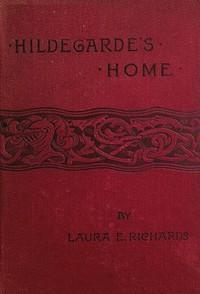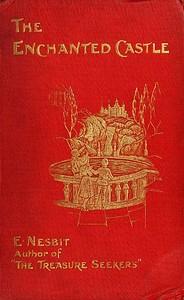Read this ebook for free! No credit card needed, absolutely nothing to pay.
Words: 46452 in 21 pages
This is an ebook sharing website. You can read the uploaded ebooks for free here. No credit cards needed, nothing to pay. If you want to own a digital copy of the ebook, or want to read offline with your favorite ebook-reader, then you can choose to buy and download the ebook.


: Hildegarde's Home by Richards Laura Elizabeth Howe Merrill Frank T Illustrator - Conduct of life Juvenile fiction; Friendship Juvenile fiction; Country life Juvenile fiction; Inheritance and succession Juvenile fiction; Youth Conduct of life Juvenile ficti
HILDEGARDE'S HOME.
THE HOME ITSELF.
IT was a pleasant place. The house was a large, low, old-fashioned one, with the modern addition of a deep, wide verandah running across its front. Before it was a circular sweep of lawn, fringed with trees; beside it stood a few noble elms, which bent lovingly above the gambrel roof. There were some flower-beds, rather neglected-looking, under the south windows, and there was a kitchen-garden behind the house. This was all that Hildegarde Grahame had seen so far of her new home, for she had only just arrived. She stood now on the verandah, looking about her with keen, inquiring eyes, a tall, graceful girl, very erect, with a certain proud carriage of the head. Her dress of black and white shepherd's plaid was very simple, but it fitted to perfection, and there was a decided "air" to her little black felt hat.
Hildegarde's father had died about six months before the time our story opens. He had been very wealthy, but many of his investments had shrunk in value, and the failure of a bank whose cashier had proved dishonest entailed heavy losses upon him; so that, after his death, it was found that the sum remaining for his widow and only child, after all debts were paid, was no very large one. They would have enough to live on, and to live comfortably; but the "big luxuries," as Hildegarde called them, the horses and carriages, the great New York house with its splendid furniture and troops of servants, must go; and go they did, without loss of time. Perhaps neither Hildegarde nor her mother regretted these things much. Mrs. Grahame had been for years an indefatigable worker, giving most of her time to charities; she knew that she should never rest so long as she lived in New York. Hildegarde had been much in the country during the past two years, had learned to love it greatly, and found city life too "cabined, cribbed, confined," to suit her present taste. The dear father had always preferred to live in town; but now that he was gone, they were both glad to go away from the great, bustling, noisy, splendid place. So, when Mrs. Grahame's lawyer told her that an aged relative, who had lately died, had left his country house as a legacy to her, both she and Hildegarde said at once, "Let us go and live there!"
Accordingly, here they were! or to speak more accurately, here Hildegarde was, for she and auntie had come by an early train, and were to have everything as comfortable as might be by the time Mrs. Grahame and the little housemaid, who had stayed to help her pack the last trifles, should arrive in the afternoon.
It was so pleasant on the wide verandah, with the great elms nodding over it, that Hildegarde lingered, until a mellow "Miss Hildy, chile! you comin'?" summoned her in-doors. Auntie had already put on her white jacket and apron, without which she never considered herself dressed, and her muslin turban looked like a snow-drift on an ebony statue. She had opened the door of a large room, and was peering into it, feather duster in hand.
"'Spose this is the parlour!" she said, with a glance of keen observation. "Comicalest parlour ever I see!"
"Reckon my kittle makes a better music 'an that!" she said; and then, relenting, she added, "might ha' been pooty once, I dassay. That's a pooty picture, anyhow, over the mankel-piece."
Hildegarde looked up, and saw a coloured print of a lady in the costume of the First Empire, with golden ringlets, large blue eyes, particularly round rosy cheeks, and the most amiable simper in the world. Beneath was the inscription, "Madame R?camier, Napoleon's first love."
"Oh!" cried Hildegarde, half-laughing, half-indignant, "how ridiculous! She wasn't, you know! and she never looked like that, any more than I do. But see, auntie! see this great picture of General Washington, in his fine scarlet coat. I am sure you must admire that! Why!--it cannot be--yes, it is! it is done in worsted-work. Fine cross-stitch, every atom of it. Oh! it makes my eyes ache to think of it."
Auntie nodded approvingly. "That's what I call work!" she said. "That's what young ladies used to do when I was a gal. Don't see no sech work nowadays, only just a passel o' flowers and crooked lines, and calls it embr'idery."
"Oh! you ungrateful old auntie," cried Hildegarde, "when I marked your towels so beautifully last week. Here! since you are so fond of cross-stitch, take this dreadful yellow sofa-pillow, with pink roses worked on it. It will just fit your own beloved rocking-chair, with the creak in it, and you may have it for your very own."
Free books android app tbrJar TBR JAR Read Free books online gutenberg
More posts by @FreeBooks

: Notes of a staff officer of our First New Jersey Brigade on the Seven Day's Battle on the peninsula in 1862 by Grubb E Burd Edward Burd - Seven Days' Battles Va. 1862; United States History Civil War 1861-1865 Regimental histories New Jersey Infantry Kearn


: Shadowings by Hearn Lafcadio - Cicada (Genus); Names Personal Japanese; Japanese poetry Translations into English


: The Enchanted Castle by Nesbit E Edith Millar H R Harold Robert Illustrator - Fantasy fiction English; Friendship Juvenile fiction; Siblings Juvenile fiction; Magic Juvenile fiction; Wishes Juvenile fiction; Castles Juvenile fiction; Rings Juvenile fiction




